The Sixth Region Diaspora Caucus: Organizing the Global Afrikan Diaspora
May 25, 2013 marks the 50th anniversary of the founding of the Organization of African Unity (OAU). The OAU was established in May of 1963 to help secure the political independence of the countries of Africa as they sought to free themselves from the control of the neocolonial powers (Great Britain, France, Belgium, Portugal, Germany, Spain, Italy and others). While this goal was largely achieved, the second, equally important, objective of bringing about continental unity between the countries of Africa was not, and no sooner had many African countries won their political independence than they were quickly brought back under the control of their former colonizers through military coups d’état (such as the overthrow of Patrice Lumumba of the Democratic Republic of Congo in 1960 and Kwame Nkrumah of Ghana in 1963) and corporate takeovers of African resources (such as diamond mines in southern Africa, oil drilling in the Niger River Delta of Nigeria and coltan mines in eastern DR Congo). Seeing the rise of “puppet dictators” in many African countries but still no progress in creating continental unity between African countries, the OAU was disbanded in 2000 and, in 2001, the African Union (AU) was founded.
The African Union’s express purpose is to bring about the unity of African countries and to create what it calls a more “people-centered” continent. An important part of this is the need to connect with the African Diaspora, those descendants of Africa who have been dispersed around the world by both immigration and the Trans-Atlantic Slave Trade.
The concept under which the unity of African countries is to be established is commonly referred to as the United States of Africa or the Union of African States. In this way, the African continent would function in many ways similarly to the United States of America. Instead of the current 55 sovereign countries (of which only 54 are members of the AU), the continent would consist of 55 states that would retain certain levels of autonomy but would function together as one federalized nation as the US does. A number of advantages are seen in this arrangement, among which are:
• the establishment of an official continental language, in this case Kiswahili, which has already been established as a continental trading language;
• the development of a continental defense force, which would ultimately eliminate the need for NATO to intervene in crises such as those in Sudan, Somalia and Libya;
• the creation of a continental currency, so that African nations will no longer be forced to use the British Pound, the French CFA Franc and other currencies from which the former colonial powers still take an unfair percentage of proceeds, thus keeping African nations in a state of economic dependency;
• the elimination of hard borders, so that a traveler could venture from Cape Town to Cairo without the need for multiple visas.
The idea of a “people-centered” continent means that not only would heads of state, ambassadors and business leaders have a voice, but the “common people” would also be heard through a council of “civil society representatives”. These representatives would be elected to speak on behalf of grassroots communities in the 55 African countries as well as in African-descendant communities throughout the Diaspora, in other words, people around the world of African descent.
The African Union made its intention to reach out to the African Diaspora known in 2003 when it made an important revision to its Constitutive Act, to “invite and encourage the full participation of the African Diaspora as an important part of our continent, in the building of the African Union.” Then, in 2006, a Roundtable Meeting of a number of Pan-African organizations was held in California. At this meeting, the African Union’s proposed definition of the African Diaspora was discussed and accepted. “The African Diaspora are peoples of African descent and heritage living outside the continent, irrespective of their citizenship and who are willing to contribute to the development of the continent and the building of the African Union.” This definition includes people who were born in Africa and emigrated to the US and other parts of the Diaspora, as well as those of us who were born here but who can trace our ancestry back to 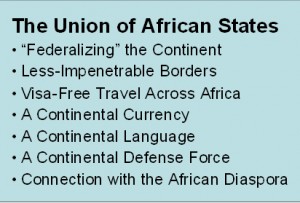 Africa. Thus, if you were born in Nigeria but moved to the US several years ago, you are part of the African Diaspora. If you recently visited www.ancestry.com and it told you that you have Ancestors in Ghana but that you also have Ancestors in Ireland and Wales, your African ancestry makes you a member of the African Diaspora. If you have lived in the US all your life, can trace your lineage to Black communities in Virginia or Mississippi or South Carolina but have no idea where your Ancestors in Africa lived, you are part of the African Diaspora. At that point, the only criterion you must meet is your willingness to take part in the global African renaissance of bringing the African Diaspora together with African people on the “Mother Continent” by answering the invitation of the African Union.
Africa. Thus, if you were born in Nigeria but moved to the US several years ago, you are part of the African Diaspora. If you recently visited www.ancestry.com and it told you that you have Ancestors in Ghana but that you also have Ancestors in Ireland and Wales, your African ancestry makes you a member of the African Diaspora. If you have lived in the US all your life, can trace your lineage to Black communities in Virginia or Mississippi or South Carolina but have no idea where your Ancestors in Africa lived, you are part of the African Diaspora. At that point, the only criterion you must meet is your willingness to take part in the global African renaissance of bringing the African Diaspora together with African people on the “Mother Continent” by answering the invitation of the African Union.
The Sixth Region Diaspora Caucus (SRDC)
When the African Union made this invitation to the Diaspora, it also recognized the fact that it did not know the African Diaspora very well. When AU officials look at the Diaspora, they see literally thousands of organizations, from the NAACP to the A-APRP, all with their own specific political platforms, programs and goals. The AU realized that no single one of these organizations could effectively represent all members of the African Diaspora. What was needed was one organization that would dedicate itself to bring members of the African Diaspora together who were ready to accept the AU’s invitation and help take the combined voice of the African Diaspora to the AU to share our wants, our needs, our aspirations, but most of all our ideas and solutions to help not only ourselves in the African Diaspora, but also our long-lost relatives in Africa. Groups of activists, organizers, educators, workers and just “regular folks” in local communities in the US, Canada, Central America, the Caribbean, South America, Europe and Asia have been answering this call since 2006. In the United States, we are called the Sixth Region Diaspora Caucus (SRDC).
The name comes from the designation the AU has tentatively given to the African Diaspora. The African Continent is currently divided into five (5) socio-political regions: North, South, East, West and Central Africa. The Diaspora would thus constitute a Sixth Region.
While the African Union is not sufficiently knowledgeable about the African Diaspora (Most of us in the Diaspora are not), it has established several standards for our participation, as well as a “roadmap” for us to gradually become more involved in the workings of the AU. That “roadmap” begins with the election of Representatives to a civil-society advisory organization within the AU known as the Economic, Social and Cultural Council (ECOSOCC). This organization would not have the power to create policy or legislation, but would instead advise the Heads of State and the Ambassadors on issues that affect the general population of the African Continent and the Diaspora. ECOSOCC currently consists of 150 elected seats, with 130 of them for Representatives from Africa and 20 for Representatives from the African Diaspora. This is a very small first step, especially with only 20 seats for the African Diaspora, but it could lead to other opportunities if our work in ECOSOCC proves successful and fruitful for the AU and for the Diaspora.
As was mentioned above, there are also a number of standards which the AU has established for those who would become Representatives:
(1) Those of us who would represent the Diaspora cannot be holders of official positions of leadership in the governments of the countries in which we live. For example, President Obama could not become a Representative of the African Diaspora because he is an official head of state (President) of a foreign power, in this case the United States.
(2) A representative of the Diaspora cannot be appointed or self-proclaimed. Representatives from the Diaspora must have been elected by members of their community to represent them.
SRDC’s current mission, in a nutshell, is to establish a Representative voice for the African Diaspora in the African Union, based on the “roadmap” and the standards established by the AU. Following that “roadmap”, our work begins with ECOSOCC.
The Organizing Method
How is this done? How can an African Diaspora of over three hundred million people find a representative voice in a group of only 20 activists, as committed as they may be?
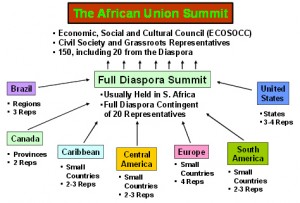 SRDC has developed a plan to ensure that Representatives to ECOSOCC are elected, are committed and are prepared to handle the responsibilities they will face. The key to the plan is local organization.
SRDC has developed a plan to ensure that Representatives to ECOSOCC are elected, are committed and are prepared to handle the responsibilities they will face. The key to the plan is local organization.
Considerable African Diaspora populations have been found to exist in approximately 3/5 of the current nation-states in the world. In virtually all of these countries, whether in favelas, in quilombos or in other residential neighborhoods, there is some type of tradition of the Town Hall, village gathering, community meeting or caucus get-together to discuss issues, to vote and to plan for the future. SRDC’s plan incorporates that common tradition to organize the Diaspora first on the local level, then on the state, national and global level.
The Diaspora has been organized into sub-regions: Canada, the US, Central America, the Caribbean, South America, Brazil, and Europe (including Asia). Each of these sub-regions will be responsible for coordinating the local efforts in their sub-region, determining who among the local representatives will speak for their whole sub-region, and developing the platform or agenda that details the contribution each sub-region plans to make to the African Union, as well as what issues they hope the AU will support them with in the Diaspora. The 20 Diaspora Representatives have been estimated to be split up among the sub-regions as follows: the United States – 3 or 4; Canada – 1 or 2; Central America – 2 or 3; the Caribbean – 2 or 3; South America – 2; Brazil – 3; and Europe/Asia – 3 or 4. (Some of these details are still being worked out.) The 20 Diaspora Representatives, once they are determined at each of the sub-regional organizing summits, would then meet in a Full Diaspora Summit. The whole process begins, however, with the local organization and the local Representatives.
International Facilitators from African Diaspora organizations affiliated with SRDC have been established in each of these sub-regions, and each sub-region has established its own specific local organizing plan. In a nutshell, Canada is organizing itself by province, Europe and Asia are organizing themselves by country, and so are Central America, the Caribbean and South America. Brazil, with somewhere between 85 and 115 million people of African descent, constitutes a separate sub-region and will most likely organize itself according to African Diaspora populations in its 26 states and its municipalities.
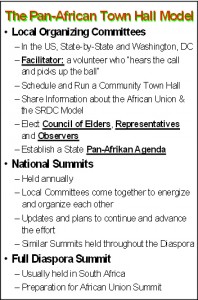 The United States, where SRDC operates, is coordinated by a National Secretariat (which is made up of the state and International Facilitators) but is being organized at the state level. This means that every state should establish an SRDC organization, plus the District of Columbia (which does not belong to a state but still comprises a large and important African Diaspora population). Thus, there would be 51 organizations in the United States. Each of the 51 organizations would ultimately elect two (2) local Representatives who will take the voice of the people of that state to a National Summit which is held once a year. Thus, once all the local organizations in the US have been established, there will be 51 delegations attending the National Summit, including the state Facilitators, Elders, and a total of 102 local Representatives.
The United States, where SRDC operates, is coordinated by a National Secretariat (which is made up of the state and International Facilitators) but is being organized at the state level. This means that every state should establish an SRDC organization, plus the District of Columbia (which does not belong to a state but still comprises a large and important African Diaspora population). Thus, there would be 51 organizations in the United States. Each of the 51 organizations would ultimately elect two (2) local Representatives who will take the voice of the people of that state to a National Summit which is held once a year. Thus, once all the local organizations in the US have been established, there will be 51 delegations attending the National Summit, including the state Facilitators, Elders, and a total of 102 local Representatives.
The effort in each state begins with the commitment of one individual activist or organization that sees the importance of this work. Whoever first takes on the responsibility of organizing the African Diaspora in their state becomes the Facilitator for that state. The first and primary job of the Facilitator is to get the organizing effort started by planning, organizing, popularizing and running a Community Town Hall. The Town Hall is the first of the two meetings that will lead to your state establishing its Representatives. The Town Hall, in the spirit of the village gathering, community meeting or caucus get-together, must be promoted far and wide, using whatever means are available to spread the word to the community: letters, flyers, email, announcements at church or other community meetings, phone calls, Facebook, notices at businesses, articles in newspapers and magazines, Web Sites, community radio interviews or word-of-mouth. It is important that all members of the African Diaspora community have the opportunity to learn about the Town Hall and to attend the meeting, though the likelihood is that a small percentage of the population will actually attend these meetings at first.
Of course, it is important to obtain a space in which to hold the meeting. A community center is usually the least expensive option and thus is the most popular, but church halls and other locations can be used as long as they are places where the people can attend. Because this process will likely take a while to catch on, a small-to-medium-size facility may be sufficient, unless you are extremely talented at event promotion.
When the Town Hall is held, it is important to have a program. The Town Hall process usually involves four key steps: (1) tell the community about the African Union, the African Union Initiative and the mission of SRDC; (2) establish a Community Council of Elders, either by nomination-and-election or, if a Council of Elders has already been established in your state, obtain their support of the process and introduce them to the community; (3) nominate committed community activists to be Representatives for the state, and also nominate Observers who will work with them in a supporting role; (4) discuss the issues that impact the African Diaspora community in your state that need to be taken to the national and international level. The nominees are reviewed by the Council of Elders to ensure that they meet agreed-upon qualifications to assume their responsibilities.
About a month after the Town Hall has been held and the nominees for Representative and Observer have been established, the next community meeting is a Voting Caucus, at which the nominees have an opportunity to speak to the community and answer questions, after which a community election is held to determine who will be the official Representatives for the African Diaspora community in the state.
Professor David Horne, SRDC’s International Facilitator from Southern California, 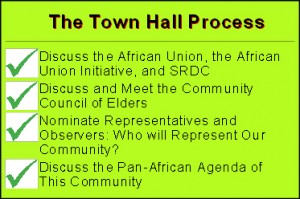 offers these words of encouragement for those who would take on this organizing challenge: “No, you won’t get everybody there. No, everybody will not agree with even doing this. However, those who show up will do the voting, and your certification of the results will simply be your record of publicizing the meetings and providing a reasonable forum for public discussion and participation. That’s all the AU requires — publicize, vote and document the process. … You know your own state and where Black folk are. You decide the best place to hold the Town Hall Meeting and the Voting Caucus. In summary, get a facility, set up at least two meeting dates (one for the Town Hall, one for the Voting Caucus), publicize the heck out of the meeting dates, bring in speakers and advisers (usually experienced SRDC organizers), have the meetings, document the process and elect the Representatives. Send that documentation to the SRDC National Secretariat. That’s it.”
offers these words of encouragement for those who would take on this organizing challenge: “No, you won’t get everybody there. No, everybody will not agree with even doing this. However, those who show up will do the voting, and your certification of the results will simply be your record of publicizing the meetings and providing a reasonable forum for public discussion and participation. That’s all the AU requires — publicize, vote and document the process. … You know your own state and where Black folk are. You decide the best place to hold the Town Hall Meeting and the Voting Caucus. In summary, get a facility, set up at least two meeting dates (one for the Town Hall, one for the Voting Caucus), publicize the heck out of the meeting dates, bring in speakers and advisers (usually experienced SRDC organizers), have the meetings, document the process and elect the Representatives. Send that documentation to the SRDC National Secretariat. That’s it.”
Now, the State Organizing Committee is in place, and the next step is … to do it again. Every state organization is constantly seeking to better represent their local communities and to make more and more people aware of SRDC’s mission. According to the SRDC Constitution, elected Representatives and Observers serve two-year terms, and are limited to serving two of these terms. This helps keep fresh ideas coming in and prevents “career activists” from regarding their positions as their own personal property, as so often seems to happen with positions in elective office. This means the Facilitator and the rest of the Organizing Committee from that state must continue to seek out the community to share information with and learn from them.
From Local Organizing to Pan-African Activism
As we stated earlier, the key is the local organization. However, that local organization’s influence is truly felt only when it comes together with other local organizations through day-to-day communication, in the Teleconferences and at the National Summit.
State Facilitators are expected to maintain a degree of regular communication with each other. In this way, experienced members are able to share their perspectives and insight with newer Facilitators, Representatives, Observers and Elders. Specific problems that one Facilitator faces have usually already been dealt with by others, and that experience can be extremely helpful. Often, a newer Facilitator will establish a positive organizational relationship with one or more veteran members to gain insights, information and updates about the organization. Topics of discussion can include understanding the situation regarding the African Union, questions about community organizing, interpersonal issues between members, and fund-raising, among others. Emails, telephone calls and face-to-face meetings are common and encouraged as long as they are practical.
Teleconferences are monthly telephone conversations that are held between the Facilitators of the different states, who, along with the International Facilitators and other key officers constitute the National Secretariat. During the Teleconferences, the states have the opportunity to catch up on the international situation with regard to the effort to finalize our Representative seats in the African Union, as well as to discuss issues of immediate importance to the organization.
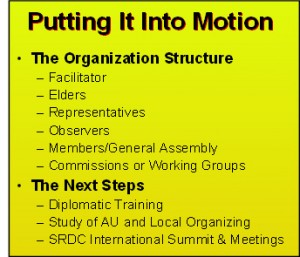 The National Summit is held once a year. The states “take turns” hosting the Summit. As of 2012, there have been six National Summits: Washington, DC (2007); Columbus, OH (2008); Seattle, WA (2009); Charleston, SC (2010); Baltimore, MD (2011); and Nashville, TN (2012). At these Summits, members from different states meet and get to know each other, learn about the issues specific to each others’ communities, and share ideas and updates with each other. Workshops and presentations provide information about the organization’s programs, from youth outreach to business-and-trade development across the African Continent and the Diaspora, and to help develop specific skills in African Consensus, Parliamentary Procedure (both of which are used in African Union meetings), diplomatic training (a must for anyone who represents the African Diaspora in an international setting), community organizing, morality-and-ethics, conflict-resolution and other skill-development subjects. And the National Agenda of the US’s African Diaspora is formulated, revised or reinforced as appropriate.
The National Summit is held once a year. The states “take turns” hosting the Summit. As of 2012, there have been six National Summits: Washington, DC (2007); Columbus, OH (2008); Seattle, WA (2009); Charleston, SC (2010); Baltimore, MD (2011); and Nashville, TN (2012). At these Summits, members from different states meet and get to know each other, learn about the issues specific to each others’ communities, and share ideas and updates with each other. Workshops and presentations provide information about the organization’s programs, from youth outreach to business-and-trade development across the African Continent and the Diaspora, and to help develop specific skills in African Consensus, Parliamentary Procedure (both of which are used in African Union meetings), diplomatic training (a must for anyone who represents the African Diaspora in an international setting), community organizing, morality-and-ethics, conflict-resolution and other skill-development subjects. And the National Agenda of the US’s African Diaspora is formulated, revised or reinforced as appropriate.
A State Facilitator is Never Alone
As we have grown from just a few scattered activists in 2006 to organizations in eight states, 12 countries and three continents by early 2013, the current Facilitators, Elders, Representatives and Observers of SRDC and its allied organizations have learned much about community outreach, community organizing and international diplomacy. We have also learned how to deal with the occasional frustrations that come with this work. We have learned the importance of perseverance, hard work and patience, and we are ready to share that knowledge and experience with others. In short, as a state Facilitator, you are never alone. The nearest state Facilitator is ready and willing to assist you in getting your state organization started (including assisting with your state’s Town Hall, Voting Caucus and follow-up) and to help you chart the way forward. Because we all realize that we don’t know everything, we must be willing to share information and learn from each other. It is with this attitude that we plan to continue to grow and prosper as an organization, and to carry our mission of Organizing the Diaspora forward so that a brighter day for African people will be close at hand.
Please feel free to visit our Web Site (www.srdcinternational.org) or contact us for further information about SRDC, or if you are interested in either contacting the Facilitator in your state or starting an organization in a new state. We look forward to Organizing the Diaspora with you!
Warm regards,
Bro. Cliff
Editor, KUUMBAReport
Maryland State Facilitator, Sixth Region Diaspora Caucus (SRDC)
Bro. Cliff’s email: cliff@kuumbareport.com
Further Contact Information
Organizational Web Site: www.srdcinternational.org
Organizational email: OrganizingSRDC@aol.com
Public Information Office email: srdcpub@gmail.com

Pingback: Why Are We Still Disorganized? | SRDC International